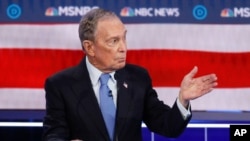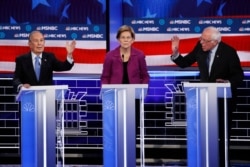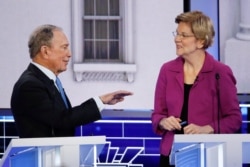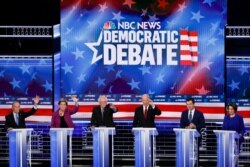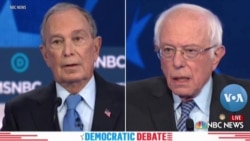Michael Bloomberg waited until November to launch his campaign to be the Democratic Party’s nominee in the 2020 presidential election.
His opponents in Wednesday night’s debate in the Western state of Nevada did not wait at all to attack his political record as the former mayor of New York City, allegations of sexism and sexual harassment, and his status as a multibillionaire.
Before Wednesday, people across the United States were largely aware of Bloomberg’s campaign through television ads, which have saturated airwaves since November at a cost of nearly $400 million of his own money.
But the debate put him on stage with the top contenders for the Democratic nomination for the first time, meaning he had to answer questions in real time about his past and why he should be the one to oppose President Donald Trump in November.
Mutual pushback
The pushback began with Vermont Senator Bernie Sanders.
“In order to beat Donald Trump, we’re going to need the largest voter turnout in the history of the United States. Mr. Bloomberg had policies in New York City of stop and frisk, which went after African American and Latino people in an outrageous way. That is not a way you’re going to grow voter turnout,” Sanders said.
Bloomberg countered by casting doubt about the electability of Sanders, the front-runner in national polls.
“If he goes and is the candidate, we will have Donald Trump for another four years, and we can’t stand that,” Bloomberg said.
Whatever momentum Bloomberg may have felt from the first exchange of the debate was immediately challenged by Massachusetts Senator Elizabeth Warren, who said she will support whoever is the party’s eventual nominee but that the party would “take a huge risk if we just substitute one arrogant billionaire for another.”
“I’d like to talk about who we’re running against, a billionaire who calls women fat broads and horse faced lesbians. And no, I’m not talking about Donald Trump, I’m talking about Mayor Bloomberg. Democrats are not going to win if we have a nominee who has a history of hiding his tax returns, of harassing women, and of supporting racist policies like redlining and stop and frisk,” she said.
Talk time
While Bloomberg was the initial focus on the debate, as the night went on he was not as involved as the other candidates who each had taken part in eight debates dating back to June of last year.
Warren, Sanders, Minnesota Senator Amy Klobuchar, former South Bend, Indiana Mayor Pete Buttigieg and former Vice President Joe Biden all spoke more than Bloomberg. Tallies of speaking time showed the gap between the leader — Warren — and Bloomberg was about three minutes.
Sexual harassment allegations
Bloomberg and Warren sparred several times, including pointedly about the allegations against Bloomberg and his company of sexism and sexual harassment, and the number of non-disclosure agreements people involved in those accusations have signed, agreeing not to discuss them publicly.
“None of them accuse me of doing anything other than maybe they didn’t like a joke I told,” Bloomberg said. “These would be agreements between two parties that wanted to keep it quiet. And that’s up to them. They signed those agreements, and we’ll live with it.”
Warren countered that Bloomberg at that moment could announce he was releasing the signatories from those agreements in the name of transparency.
Bloomberg declined to do so, saying the agreements were made consensually, “and they have every right to expect that they will stay private.”
WATCH: Bloomberg Targeted in Debate Debut
Winning
His campaign said the attacks against Bloomberg meant he was “a winner,” and that he “was the grownup in the room.”
“He was just warming up tonight,” campaign manager Kevin Sheekey said in a statement. “We fully expect Mike will continue to build on tonight’s performance when he appears on the stage in South Carolina next Tuesday.”
The same six candidates have qualified for that debate ahead of what will be the last contest Bloomberg decided to skip as he focused his first electoral efforts on the 14 states where voters will cast ballots on March 3.




